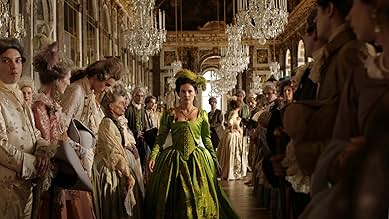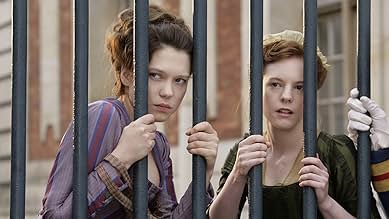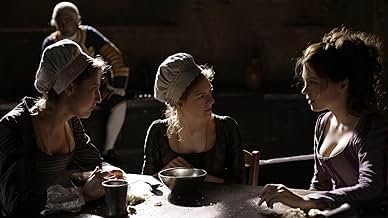Les adieux à la reine
- 2012
- Tous publics
- 1h 40min
NOTE IMDb
6,2/10
9,4 k
MA NOTE
Un regard sur la relation platonique entre Marie-Antoinette et l'une de ses lectrices pendant les premiers jours de la Révolution française.Un regard sur la relation platonique entre Marie-Antoinette et l'une de ses lectrices pendant les premiers jours de la Révolution française.Un regard sur la relation platonique entre Marie-Antoinette et l'une de ses lectrices pendant les premiers jours de la Révolution française.
- Réalisation
- Scénario
- Casting principal
- Récompenses
- 6 victoires et 12 nominations au total
Julie-Marie Parmentier
- La servante Honorine Aubert
- (as Julie-Marie Parmentier de la Comédie Française)
Marthe Guérin Caufman
- La domestique Alice
- (as Marthe Caufman)
Hervé Pierre
- L'abbé Hérissé
- (as Hervé Pierre de La Comédie Française)
Avis à la une
It's July, 1789, and French citizenry is starting to revolt. Queen Marie Antoninette (Diane Kruger) is hold up at Château de Versailles with her court and her book reader (Léa Seydoux). When the news of the storming of the Bastille reaches them, panic sets in and the King's entourage start slipping away.
It's fascinating to see the various reaction as rumors start to spread. Léa Seydoux is great as the doe-eyed true believer. It is disconcerting to know her true naivety even though she has no idea. It's the source of the tension, but it's also infuriating. Diane Kruger is fine, but I thought that it wasn't quite big enough. However, the climax was just right.
It's fascinating to see the various reaction as rumors start to spread. Léa Seydoux is great as the doe-eyed true believer. It is disconcerting to know her true naivety even though she has no idea. It's the source of the tension, but it's also infuriating. Diane Kruger is fine, but I thought that it wasn't quite big enough. However, the climax was just right.
I must admit, when I went to see this film I thought: Not another picture about the revolution in France, I must have seen 20 already. I was pleased to find however that Benoit Jacquot has given the period a lot of thought, and has made one of the more effective costume films in recent years. His Sade of 2000 starred Daniel Auteuil and Isild le Besco, treating one of the lesser figures of the period with great insight into his character. Les adieux a la reine is no less engrossing; he takes us into the cramped corridors of the palace, where the small people live in dingy quarters and hope (usually fruitlessly) to be noticed by the royal couple. The night scene with the courtiers fearfully scanning the list of 286 notables who must have their heads chopped off, lit with a brackish yellow candle light is wonderfully effective.
The performances make the film. Diane Kruger, with her slight accent, makes a wonderful Marie Antoinette: sensing doom, yet still able to reach out to those around her. It's easy to see why Sidonie reveres her. Lea Seydoux, whom I hadn't noticed much up to now, shows much promise as an actress, scurrying around the palace trying to gather information about the riots in Paris. Her face is sometimes sullen, sometimes smiling, always interesting. Xavier Beauvois does well as the King. Finally Virginie Ledoyen as Yolande de Polignac--"the indisputably ravishing but dim-witted Yolande" as Simon Schama calls her. Ledoyen is as imperious and shallow as you could wish. You see how the Queen could lose her head (in both senses) over her.
The performances make the film. Diane Kruger, with her slight accent, makes a wonderful Marie Antoinette: sensing doom, yet still able to reach out to those around her. It's easy to see why Sidonie reveres her. Lea Seydoux, whom I hadn't noticed much up to now, shows much promise as an actress, scurrying around the palace trying to gather information about the riots in Paris. Her face is sometimes sullen, sometimes smiling, always interesting. Xavier Beauvois does well as the King. Finally Virginie Ledoyen as Yolande de Polignac--"the indisputably ravishing but dim-witted Yolande" as Simon Schama calls her. Ledoyen is as imperious and shallow as you could wish. You see how the Queen could lose her head (in both senses) over her.
A marvelous film. Very rarely does a film based on fact, especially a story as infamous as this one, succeed at creating such tension despite the fact that everyone knows pretty much what is going on and what will happen (United 93 springs to mind). As it is director Benoît Jacquot and his team have done a incredible job in capturing the confusion, uncertainty and pure dread that those living at Versailles in the final days of the Monarchy must have felt. Seriously, anyone who's ever dismissed period dramas and films based on true stories as "stuffy", slow and boring should give this one a shot. The cast is also exceptionally strong, led by a group of immensely talented female performers. The only downside is really the ending, unfortunately, slightly anticlimactic and a bit of a let down.
This is a modern historical drama. Characters are not well-developed, and their motivations are not clear. Why is Sidonie so devoted to the Queen? Why does she suddenly want to have sex with the gondolier? Instead, there is LOTS of atmosphere, which makes for one slow film.
You won't learn much about what actually happened in the week that followed the fall of the Bastille, since the story, to the extent that there is a story, is told through the eyes of one of the Queen's domestics. (It does remind you that, in a day not only before computers and the internet, but even television and radio, you could live 30 miles away from momentous events and have no idea what was going on.) Nor will you learn much about Marie-Antoinette or Louis XVI. The latter is a minor character here. MA comes off as very capricious, which she evidently was. But why? Again, there is no character development.
And then, finally, the movie stops, and you go "Oh, is it over?" As I said, LOTS of atmosphere. If that floats your boat, you might like this movie.
It did nothing for me, and I'm very interested in French history.
You won't learn much about what actually happened in the week that followed the fall of the Bastille, since the story, to the extent that there is a story, is told through the eyes of one of the Queen's domestics. (It does remind you that, in a day not only before computers and the internet, but even television and radio, you could live 30 miles away from momentous events and have no idea what was going on.) Nor will you learn much about Marie-Antoinette or Louis XVI. The latter is a minor character here. MA comes off as very capricious, which she evidently was. But why? Again, there is no character development.
And then, finally, the movie stops, and you go "Oh, is it over?" As I said, LOTS of atmosphere. If that floats your boat, you might like this movie.
It did nothing for me, and I'm very interested in French history.
Written and directed by Benoît Jacquot and based on the novel by Chantal Thomas, Farewell, My Queen explores the death throes of the French monarchy over a period of three days in July, 1789. Set in the Palace of Versailles at the beginning of the French Revolution, Sidonie (Lea Seydoux), known as the reader for Queen Marie-Antoinette (Diane Kruger), is responsible for selecting books and reading them aloud to the queen. Because of her closeness to the monarch, she is able to act as a spy, securing information about events taking place inside and outside the palace, pressing selected servants for information, and eavesdropping on conversations to gather the most up-to-date gossip to pass along to Marie.
The film is seen from Sidonie's point of view, a vantage point that illuminates the sharp social divisions inside the palace with the servants living in crowded rat-infested quarters, and the royals dwelling in opulent accommodations. Lea Seydoux delivers a powerful performance as the devoted servant of the queen, conveying an air of mystery about who she really is in a way that adds to her allure. Kruger portrays Marie-Antoinette as sensual and hedonistic and there is a hint of more than Platonism in the way she interacts with both Sidonie and the Duchess de Polignac (Virginie Ledoyen), a relationship that tests Sidonie's loyalty.
On the morning of July 15th, news spreads rapidly that the king had been awakened at two in the morning. No one knows the reason, but fear spreads throughout the court. If the king is ill, who will protect those totally dependent on the nobles who control their lives? It is soon revealed, however, that the king is not ill, but that a mob has stormed the Bastille and a revolt has begun against the aristocracy. Little information is available. Rumors abound based only on conversations whispered in the hallways and the servant's quarters. When the King travels to Paris and the Queen decides against an escape to Metz, an aura of inevitably descends on the Palace and the nobles begin to abandon ship, competing for places on the coaches seeking a safe haven.
Antoinette makes every effort to continue with business as usual, looking at magazines to admire new styles and colors for the coming season, paying scant attention to the fact that her name is number one in a list of 300 targets for the guillotine. Fearful of losing her only connection to the world, Sidonie is willing to risk the ultimate sacrifice if it is in the queen's best interest. Even though Farewell, My Queen is historically questionable and may hold us at arms length emotionally, it provides a fresh view of events that we know about only from history books or stuffy costume dramas.
Jacquot captures the authenticity of time and place and also the human side of the power struggle. Unfortunately, the film pays little attention to the issues that led to the revolt, never mentioning the abuse of power by the monarchy. Indeed, the Revolution serves only as a backdrop for the story which is more about seduction, loyalty, and betrayal than social upheaval. Rather than making a statement that is relevant for our times, the intricacies of sexual intrigue and love triangles dominate the film, titillating rather than persuading, and making the goings on difficult to care about.
The film is seen from Sidonie's point of view, a vantage point that illuminates the sharp social divisions inside the palace with the servants living in crowded rat-infested quarters, and the royals dwelling in opulent accommodations. Lea Seydoux delivers a powerful performance as the devoted servant of the queen, conveying an air of mystery about who she really is in a way that adds to her allure. Kruger portrays Marie-Antoinette as sensual and hedonistic and there is a hint of more than Platonism in the way she interacts with both Sidonie and the Duchess de Polignac (Virginie Ledoyen), a relationship that tests Sidonie's loyalty.
On the morning of July 15th, news spreads rapidly that the king had been awakened at two in the morning. No one knows the reason, but fear spreads throughout the court. If the king is ill, who will protect those totally dependent on the nobles who control their lives? It is soon revealed, however, that the king is not ill, but that a mob has stormed the Bastille and a revolt has begun against the aristocracy. Little information is available. Rumors abound based only on conversations whispered in the hallways and the servant's quarters. When the King travels to Paris and the Queen decides against an escape to Metz, an aura of inevitably descends on the Palace and the nobles begin to abandon ship, competing for places on the coaches seeking a safe haven.
Antoinette makes every effort to continue with business as usual, looking at magazines to admire new styles and colors for the coming season, paying scant attention to the fact that her name is number one in a list of 300 targets for the guillotine. Fearful of losing her only connection to the world, Sidonie is willing to risk the ultimate sacrifice if it is in the queen's best interest. Even though Farewell, My Queen is historically questionable and may hold us at arms length emotionally, it provides a fresh view of events that we know about only from history books or stuffy costume dramas.
Jacquot captures the authenticity of time and place and also the human side of the power struggle. Unfortunately, the film pays little attention to the issues that led to the revolt, never mentioning the abuse of power by the monarchy. Indeed, the Revolution serves only as a backdrop for the story which is more about seduction, loyalty, and betrayal than social upheaval. Rather than making a statement that is relevant for our times, the intricacies of sexual intrigue and love triangles dominate the film, titillating rather than persuading, and making the goings on difficult to care about.
Le saviez-vous
- AnecdotesIn this movie, Diane Kruger speaks French with a German/Austrian accent - which is undoubtedly how the Austrian-born Marie Antoinette would have spoken herself.
- GaffesOn several occasions when soldiers are marching through the main and side gates of Versailles, and also when Sidonie goes to Le Petite Trianon for the first time and falls into a puddle, you can clearly see the very 21st century anti-terrorism concrete security barriers and bollards flanking the gates.
- Citations
Agathe-Sidonie Laborde: In a way, Your Majesty, you're asking me to go as bait.
La reine Marie Antoinette: An ugly word for a pretty mouth!
Agathe-Sidonie Laborde: Words are all I possess. I wield them well.
- ConnexionsReferenced in Parole de cinéaste: Benoît Jacquot (2017)
Meilleurs choix
Connectez-vous pour évaluer et suivre la liste de favoris afin de recevoir des recommandations personnalisées
- How long is Farewell, My Queen?Alimenté par Alexa
Détails
- Date de sortie
- Pays d’origine
- Sites officiels
- Langues
- Aussi connu sous le nom de
- Farewell, My Queen
- Lieux de tournage
- Sociétés de production
- Voir plus de crédits d'entreprise sur IMDbPro
Box-office
- Montant brut aux États-Unis et au Canada
- 1 597 998 $US
- Week-end de sortie aux États-Unis et au Canada
- 72 100 $US
- 15 juil. 2012
- Montant brut mondial
- 6 366 835 $US
- Durée1 heure 40 minutes
- Couleur
- Mixage
- Rapport de forme
- 2.35 : 1
Contribuer à cette page
Suggérer une modification ou ajouter du contenu manquant

Lacune principale
By what name was Les adieux à la reine (2012) officially released in India in English?
Répondre

































